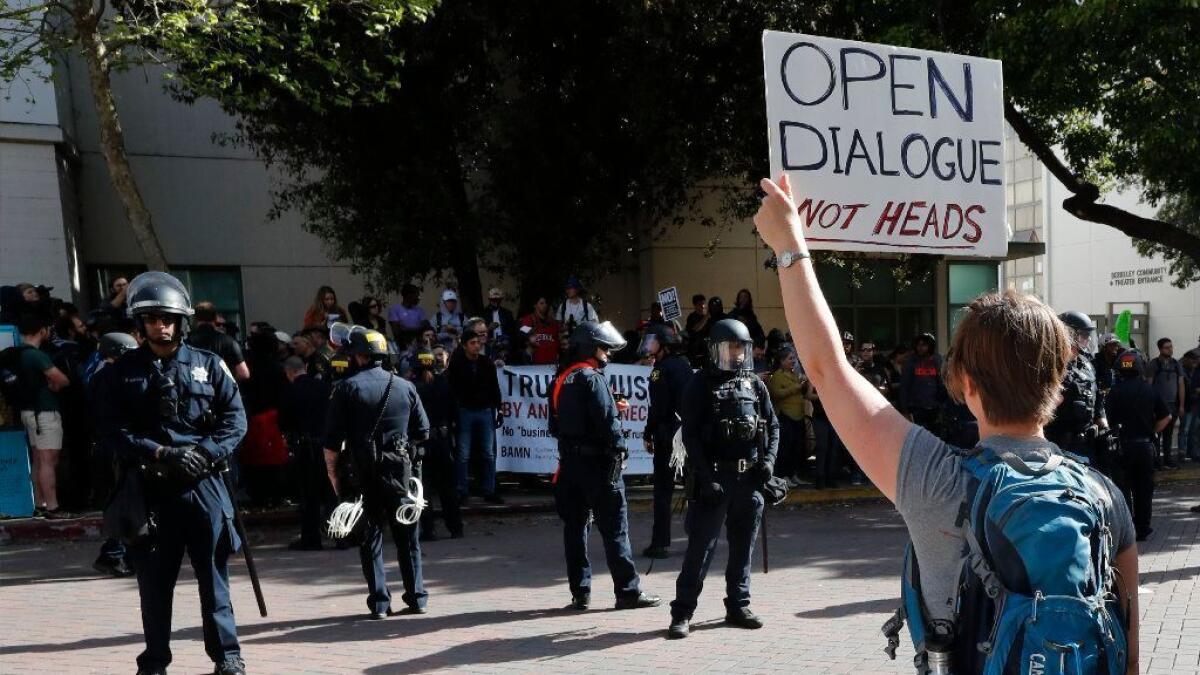Justice Department backs conservative groups in UC Berkeley free-speech fight

- Share via
The Trump administration is jumping into the fracas over free speech at UC Berkeley.
The Justice Department has filed a statement of interest supporting two conservative groups who sued the school last year. The groups alleged that administrators and campus events policy unfairly hampered their ability to book right-leaning speakers like Ann Coulter and ultimately led to the events being canceled or modified.
Associate Atty. Gen. Rachel Brand wrote in a Fox News opinion piece that certain Berkeley policies relating to location restrictions — among other things — are onerous and applied selectively. “It doesn’t require much creativity to turn this policy into a heckler’s veto,” she wrote Thursday.
She criticized the policies of several colleges across the country but was sure to single out Berkeley.
“Free speech is under attack at college campuses across the country,” Brand wrote. “The problem is not limited to a few colleges barring radical speakers to avoid a riot. Universities large and small, public and private, are restricting students’ and professors’ speech or enabling others to silence speech with which they disagree.”
In its legal brief, the Justice Department took aim at the campus events policy, writing that the “allegations, if proven, would sufficiently demonstrate the high risk of viewpoint discrimination inherent in the Policies’ grant to administrators of unchecked discretion over student-sponsored speech.”
Atty. Gen. Jeff Sessions has been outspoken on his department’s desire to protect free speech on college campuses. In a September speech at Georgetown University, Sessions poked fun at the fact that Berkeley offered counseling to anyone in the community in advance of conservative speaker Ben Shapiro’s appearance on campus.
“In the end, Mr. Shapiro spoke to a packed house,” Sessions said. “And to my knowledge, no one fainted, no one was unsafe. No one needed counseling.”
Partly as a result of its liberal legacy, Berkeley last year became the center of a national conversation about free speech on college campuses. Controversial right-wing speakers including Milo Yiannopoulos, David Horowitz and Ann Coulter attempted to speak on campus and were met with protests, which sometimes turned violent.
After Coulter’s April appearance was scuttled, the Berkeley College Republicans and the Young America’s Foundation sued university officials. That case was thrown out, but the plaintiffs filed an amended complaint in November.
The lawsuit alleged that “though UC Berkeley promises its students an environment that promotes free debate and the free exchange of ideas, it had breached this promise through the repressive actions of University administrators and campus police, who have systematically and intentionally suppressed constitutionally-protected expression by Plaintiffs (and the many UC Berkeley students whose public policy viewpoints align with Plaintiffs), simply because that expression may anger or offend students, UC Berkeley administrators, and/or community members who do not share Plaintiffs’ viewpoints.”
Harmeet Dhillon, a lawyer representing the plaintiffs, noted that the Department of Education’s general counsel signed the statement of interest. Dhillon said she hoped the university will conform its policies to the Constitution.
“I’m glad the DOJ weighed in. It would have been a natural case for them take on their own,” she said. “I think it’s helpful. I mean it’s the United States supporting our position on a constitutional legal issue.”
In an emailed statement, Berkeley spokesman Dan Mogulof called the entire lawsuit “unfounded,” adding that political views don’t factor into who gets to speak on campus.
“The campus is committed to ensuring that student groups may hold events with speakers of their choosing, and it has expended significant resources to allow events to go forward without compromising the safety or security of the campus,” said Mogulof.
“This suit has already been dismissed by the court once. The campus will continue to vigorously defend itself against these allegations.”
More to Read
Sign up for Essential California
The most important California stories and recommendations in your inbox every morning.
You may occasionally receive promotional content from the Los Angeles Times.











